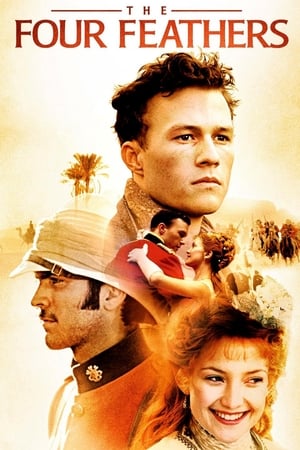
The Four Feathers
**An elegant, visually beautiful, historically well-made film, but very clean of all the controversies it could address.** The novel “The Four Feathers” has been adapted for film several times, since the days of silent films. Before seeing this film, I had seen a 1939 version, and the similarities of both films are almost as striking as their differences. Which one will be the closest to the original novel? I don't know, I haven't read the novel, but I'd bet more on the older version. I don't know if it's really worth talking about the script: Harry Faversham, a young British son of a general, is impelled by his father to follow the family tradition and becomes an officer. However, days before his regiment leaves for war, in Sudan, to face the Mahdist Revolt, he asks to leave the army, thus acquiring the label of coward, marked by the offer of the famous white feathers. Faced with this, he radically changes his mind, and decides to go, at his own risk, to Sudan, alone, with the idea of returning their feathers. Well, what was good about the older films was their ability to make this story seem more plausible, explaining the character's initial motivations for not going and, then, making an intelligent bet on issues of honor, reputation, pride. Without this, the protagonist's change of mind does not make sense: he was not capable of going to fight in a distant war, but he feels capable of going there, alone, and only because he was called a coward? Put that way, it's absurd. This film adaptation has handled this shift in thinking poorly, doesn't explain it properly, and makes it all seem frivolous. The romantic relationship between Faversham and Ethne also never really feels solid. The ending is completely changed and turns out to be more acceptable than the heroic and patriotic ending of the 1939 film. Heath Ledger is a good actor and is in good shape in this film, which will certainly be one of the most interesting of his (unfortunately) short career. I also really enjoyed the work of Wes Bentley and Djimon Hounsou. But the merits of the cast end here. Kate Hudson never puts in the effort, she just seems happy in the pretty dresses she wears, and the rest of the cast doesn't get the treatment and development they should have. Technically, the film is very good. There was, clearly, a great effort in terms of historical accuracy, mainly with regard to military uniforms, equipment and tactics, in a period in which there is a lot of reliable published information - it was the Victorian era, the era of the great expansion of the British Empire, and the colonization of Africa. There is, however, a certain care not to touch “wasp nests” such as the enormous ethnocentrism that the British cultivated at the time, racism, the apology of the empire and the “civilizing mission” that the Europeans had to carry out in “savage” Africa. The film takes place in this period, but avoids touching these points in a forceful way as much as possible. Perhaps the producers were a little afraid of seeing DVDs of the film stuck in the next statue of a white colonist that a fanatical group of students decided to tear down in England. The film also took special care in recreating the sets and environments, and in the cinematography, resulting in an aesthetically beautiful and elegant work. The soundtrack, I confess, did not convince me.
